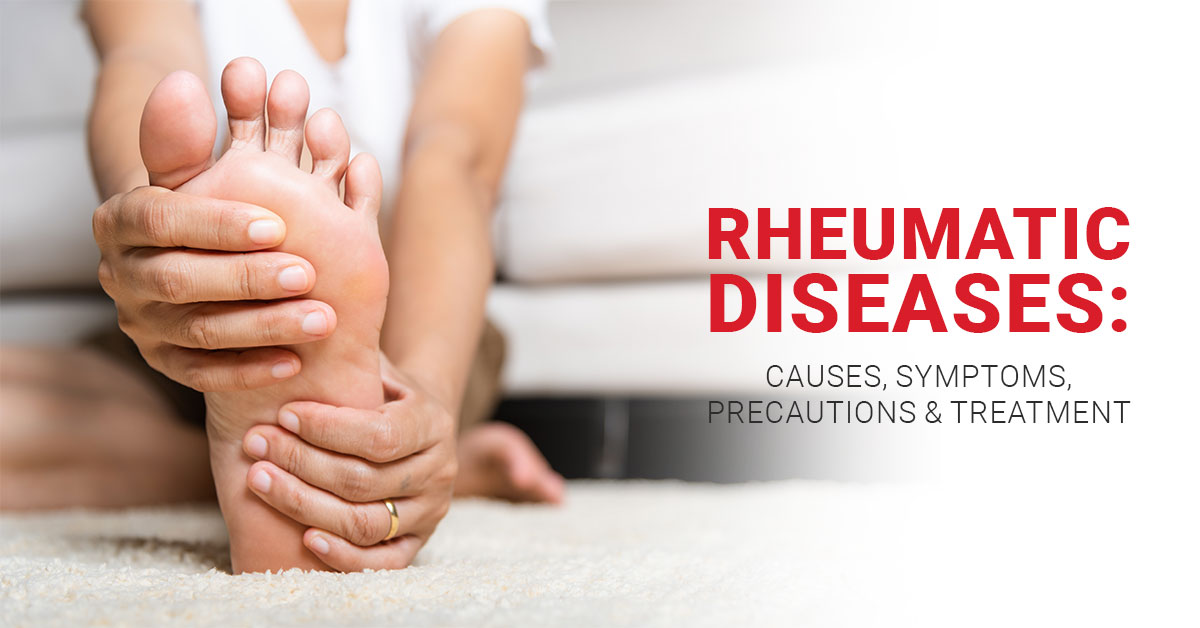
Rheumatic diseases are a group of disorders that affect the musculoskeletal system. The following article will help you understand what rheumatic diseases are and their symptoms, causes, diagnosis, treatments and preventions. Rheumatic diseases (RD) are the leading cause of disability among those 20-year to 40-year olds.
Rheumatic Diseases, also called Rheumatism, are chronic and general inflammation of the joints. It is a disease of the connective tissues. The synovial membranes lining the joints become inflamed which results in pain and swelling of the joints. Around 16 million people are currently suffering from Rheumatic Diseases all over India. Let us see what they are caused by and how can Rheumatologist treat patients suffering from this disease.
Rheumatic Diseases are a group of disorders that affect the joints, muscles and bones. They can also affect other organs including the heart and lungs. During a rheumatic disease, your body’s immune system attacks healthy cells and tissues.
This results in inflammation and pain in the affected areas of your body. If you have a rheumatic disease, you may experience stiffness or swelling in certain muscles or joints.
Rheumatic diseases are common in both children and adults. These disorders can make it difficult to perform everyday activities like walking or climbing stairs. Some types of rheumatic disease may also cause serious damage to your heart, lungs and other internal organs if left undiagnosed or untreated.
Types of Rheumatic Diseases
There are more than 200 different types of rheumatic diseases. Some of the most common types include:
- Osteoarthritis (OA)
- Rheumatoid arthritis (RA)
- Lupus (SLE)
- Gout
- Juvenile arthritis
- Back Pain
Causes
The exact cause of rheumatic diseases is unknown, but research has identified some factors that may increase your chance of developing one. These include:
- Ageing – Certain rheumatic conditions are more common in older age groups
- Family History – You may be more likely to develop a rheumatic disease if you have a parent or sibling with it
- Gender – Women are much more likely than men to develop rheumatic diseases
Symptoms
Rheumatic diseases are a group of conditions that affect the joints, muscles, and bones. According to the American College of Rheumatology (ACR), they are among the leading causes of disability.
The symptoms of rheumatic diseases vary depending on the condition. They can include:
- Pain
- Stiffness in the joints or muscles
- Swelling in one or more joints
- Fatigue- a feeling of exhaustion that does not usually go away with rest
- Low fever
Diagnosis of Rheumatic Diseases
Diagnosis of rheumatic diseases can be confirmed with blood tests and urine tests. X-rays and ultrasounds may be ordered to confirm the diagnosis. A joint fluid test may also be done in some cases.
Treatment for Rheumatic Diseases
The treatment for rheumatic diseases focuses on relieving the symptoms. Medicines like non-steroidal anti-inflammatory drugs (NSAIDs) will be prescribed to relieve pain, swelling and inflammation. Pain killers and corticosteroids may also be prescribed to reduce pain and inflammation. Physical therapy may also be recommended to improve mobility, flexibility and strength. Surgery may be recommended in some cases to relieve pressure on the nerves or to replace a joint that is severely damaged by arthritis.
Prevention of Rheumatic Diseases
Joints are more prone to injury when they are under stress because of repetitive movements or strenuous activities. Wearing proper protective gear while playing sports can help prevent joint injuries from occurring.
Rheumatic diseases are very common conditions in adults and older persons. These diseases affect physically, mentally and economically those who suffer from these disorders. We need to work with patients to make them aware of the importance of early recognition and treatment of these disorders. Regency Health provides the best care for patients suffering from rheumatic diseases.
Request a call back


 Call-an-Ambulance
Call-an-Ambulance



